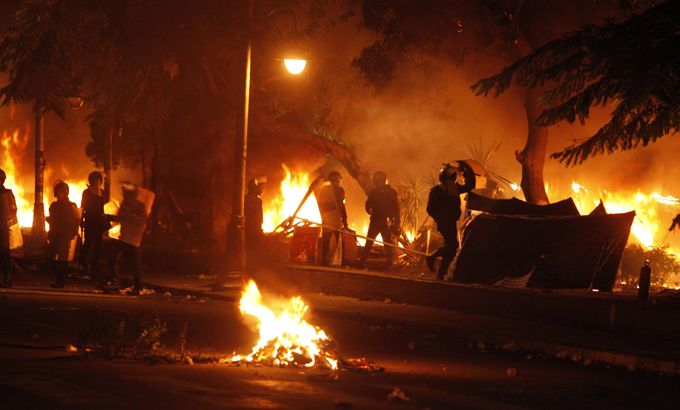Deadly clashes in Cairo as Egyptians rally
Thousands of demonstrators hit streets of Cairo, Port Said and Alexandria calling for President Morsi’s resignation.

At least one person has been killed in clashes with police after thousands of opponents of President Mohamed Morsi returned to the streets of Egypt, demanding his resignation in the wake of the deadliest violence since he came to power seven months ago.
Protesters braved Cairo rainfall on Friday to march to Tahrir Square and the presidential palace, chanting “Freedom!” and “Morsi is illegitimate!” Some tossed Molotov cocktails at the presidential palace, prompting security forces to respond with water cannon and tear gas.
Scores of protesters clashed with riot police several hundred metres from the square, witnesses said.
At least 79 people were wounded in the clashes, according to the interior ministry. Private television channels in Egypt aired footage of a man being stripped naked, beaten, and dragged along the pavement by security forces.
The country’s interior minister apologised for that incident, saying it was “the actions of individuals” and not standard police practice.
Al Jazeera’s Sherine Tadros, reporting from Cairo, described the scene near the presidential palace on Friday night as “complete mayhem”.
Security forces chased protesters away from the square, shooting tear gas at them, while protesters responded by setting fires and throwing homemade bombs back at the police.
With multi-coloured fireworks bouncing off their shields and bursting among them, helmeted and baton-wielding riot police chased protesters at the palace and set their tents ablaze. Petrol bombs briefly set fire to a building inside the compound.
In response to the violence, Morsi issued a statement vowing that security forces would “act with utmost decisiveness” to protect state buildings. Morsi’s office said the government would hold opposition groups deemed to be behind the violence “politically accountable”.
The opposition National Salvation Front, which called for mass rallies on Friday, said it “had no connection whatsoever with the trouble that erupted suddenly in front of the presidential palace”.
It said the NSF condemned all acts of violence and urged security forces to exercise “utmost restraint” with the protesters.
‘The enemy of God’
In the Suez Canal city of Port Said, meanwhile, men in black shirts of mourning marched through the city, the scene of the worst violence of the past nine days, chanting and shaking their fists.
“There is no God but God and Mohamed Morsi is the enemy of God,” they chanted. Brandishing portraits of those killed in the latest violence, they shouted: “We will die like they did, to get justice!”
|
“There is no God but God and Mohamed Morsi is the enemy of God.“ – Protesters’ chant in Port Said |
Protesters also rallied in Egypt’s second city Alexandria and Ismailiyah against policies of Morsi and his Freedom and Justice Party, which is the political wing of Muslim Brotherhood.
Protests marking the second anniversary of the uprising that toppled Hosni Mubarak have killed nearly 60 people since January 25, prompting the head of the army to warn this week that the state was on the verge of collapse.
For the Port Said marchers, Friday was also the first anniversary of a soccer stadium riot that killed 74 people last year.
Death sentences handed down to 21 defendants in soccer riots case fueled the past week’s violence in the city located on the banks of Suez Canal.
Struggle for stability
Morsi imposed a curfew and emergency rule in Port Said and two other canal cities on Sunday, a move that only seems to have added to the sense of local grievance.
Morsi’s supporters have clashed with protesters at the presidential palace in the past, although the Brotherhood has kept its men off the streets in recent days.
The protesters accuse Morsi of betraying the spirit of the revolution by concentrating too much power in his own hands and those of Muslim Brotherhood.
The Brotherhood accuses the opposition of trying to overthrow the first democratically elected leader in Egypt’s 7,000-year history.
Friday’s marches took place despite an intervention by Sheikh Ahmed al-Tayyeb, head of the 1,000-year-old al-Azhar university and mosque, who hauled in politicians for crisis talks on Thursday and pushed them to sign a charter disavowing violence.
Anti-Morsi politicians said that pact did not require them to call off demonstrations.